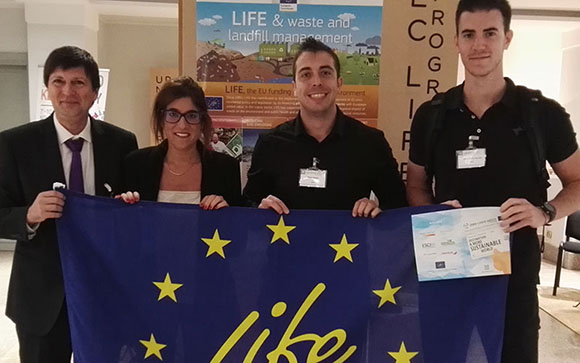
News
The Sardinia Symposia on Waste Management hosts the presentation of the ARIANDA Project
The Chair participates in the “Sardinia 2017 - 16th Waste Management and Landfill Symposium”, through the oral presentation of the ARIADNA Project.
Blanca Diaz, PhD Student at the UNESCO Chair in Life Cycle and Climate Change ESCI-UPF, hold the presentation.
The sixteenth edition of the of the Sardinia Symposia has been devoted to case studies and new technologies of Waste Management.
On October 2-6, the Sardinia 2017 - 16th Waste Management and Landfill Symposium, organised by the IWWG - International Waste Working Group, was hold in Forte Village Complex at S. Margherita di Pula (Cagliari), Italy. The sixteenth edition of the Symposia brought together more than 600 participants, with 88 oral sessions and 40 specialized workshops for a total of eight parallel tracks, discussion forums and roundtables, a continuously accessible poster area and an extensive exhibition space for companies working in the field of waste management. The UNESCO Chair in Life Cycle and Climate Change ESCI-UPF Chair participated in the event through the oral presentation of the ARIADNA Project by Blanca Díaz, PhD Student of the Waste Management and Resources Research line at the Chair.
Coinciding with the 30th Anniversary of the Sardinia Symposia, the conference provided for an “extensive discussion on the optimization of existing technologies and development of new ideas, placing particular emphasis on controversial issues such as Waste Electrical and Electronic Equipment, food waste, problems and opportunities in plastic waste management, landfill gas (including generation, emission monitoring, collection, treatments and effects), and rehabilitation of landfills”, according to the organisers.
The ARIADNA Project
Entitled “ARIADNA PROJECT: A Comparative Sustainability Assessment between two different packaging waste management systems in dispute in Spain”, the Chair’s presentation was devoted to explain the Packaging Waste Management Systems. During the presentation, Blanca Diaz exposed the results of the project to the scientific community, formed by researchers, technicians, administrators and operators.
“The modern societies are generating an increasing amount of packaging waste, while the choice of a waste management strategy depend on different legal, environmental, technical-economic and social aspects, which determine the most favourable option from a life cycle perspective,” says Diaz. “In Spain, there is an open debate about whether a Deposit Return System (DRS) should substitute or complement the current Green Dot System,” she adds. In this context, “the ARIADNA Project reveals that the introduction of the proposed DRS would cause more environmental impact, would entail a many-fold increase in the cost and would lead to worse social conditions,” highlights the researcher.
The Symposium has been an opportunity for the Chair to share the results of the Ariadna Project with the scientific community. In addition, “it has been a meeting point to discuss new methodological developments and the most innovative technologies in the field of waste management, as well as a great opportunity to contact and establish new synergies with other research centers to advance in the development of new projects and collaborations,” says Diaz.
About the Sardinia Symposia
Established in 1987, the Sardinia Symposia is a Reference Forum in the field of Waste Management for the international community, where state of the art concepts, strategies and technologies are presented and experiences shared by leading scientists, administrators and practitioners. The Symposia favoured the development of innovation in Waste Management: all new ideas and approaches applied worldwide in the last two decades were thoroughly debated and reviewed during the numerous workshop sessions in the Symposia.
Related News: "Pere Fullana y Gonzalo Blanca asisten al Simposio Internacional sobre gestión de residuos y vertederos en Cerdeña" (text in Spanish).

Members of the Chair during the Symposium. From left to right: Dr. Pere Fullana, director of the Chair, Blanca Diaz and Gonzalo Blanca, researchers at the Chair.